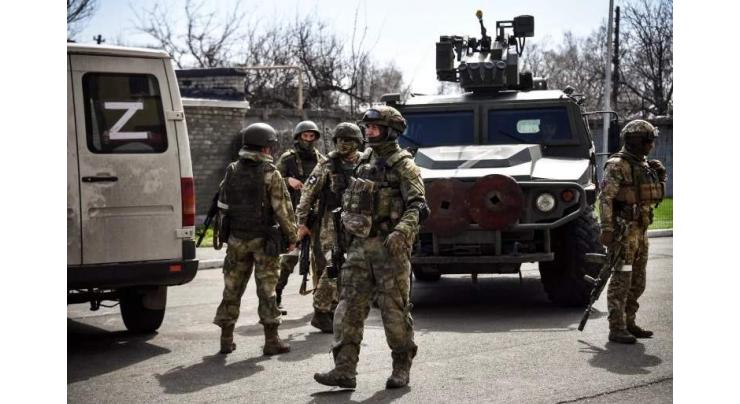
- Home
- World
- News
- US Tried for Months to Convince Kiev, NATO of Risk of Russia Entering Ukraine - Reports
US Tried For Months To Convince Kiev, NATO Of Risk Of Russia Entering Ukraine - Reports
Mohammad Ali (@ChaudhryMAli88) Published August 16, 2022 | 09:17 PM

The United States in the months leading up to Russia's special operation in Ukraine struggled to convince its NATO allies and Ukraine alike of the impending threat because of its own track record of dishonest war intelligence in Iraq and Ukraine's own denial and desire to protect its economy, The Washington Post reported on Tuesday
WASHINGTON (UrduPoint News / Sputnik - 16th August, 2022) The United States in the months leading up to Russia's special operation in Ukraine struggled to convince its NATO allies and Ukraine alike of the impending threat because of its own track record of dishonest war intelligence in Iraq and Ukraine's own denial and desire to protect its economy, The Washington Post reported on Tuesday.
In a lengthy investigative report, The Washington Post detailed the US administration's struggles since the fall last year to convince NATO, aside from the UK and Baltic members, of its growing intelligence about Russia's plans to enter Ukraine. European allies generally doubted the reliability of American intelligence due to the Bush administration's infamous pretext for invading Iraq in 2003. Ukrainian officials' skepticism was informed by the US refusal to provide specific details and their desire to avoid panicking the Ukrainian public, which Volodymyr Zelenskyy feared would lead to the flight of both capital and citizens needed to successfully defend the country.
Zelenskyy ultimately stood by his decision not to warn his country to prepare for war, arguing that Ukraine would have lost $7 billion each month since October and people would have fled rather than staying to defend their homes. Ukrainian Foreign Minister Dmytro Kuleba said the Ukrainian administration had to strike a balance between preparing for the possibility of war and keeping the economy running, noting that every US public warning about an inevitable invasion was reflected in the Ukrainian Currency exchange rate.
Although Zelenskyy had been warned by both CIA Director William Burns and US Secretary of State Antony Blinken in January that alleged Russian assassination teams might already be present in Kiev and that Russia purportedly intended to strike the capital and take down the central government, the Ukrainian leader resisted relocating himself and his government in order to avoid sowing public panic and weakening the country ahead of Russia's military operation.
Zelenskyy also feared that some Western officials wanted him to flee Ukraine because they did not have confidence that Ukraine could stand up to an attack and his departure would ease the way for Russia to install a puppet government that would negotiate a settlement with NATO.
Blinken had first warned Zelenskyy in November, but the Ukrainians reportedly did not take the threat of a massive invasion seriously until the last minute. Kuleba said US officials refused to offer Ukraine specific intelligence to back up their dire warnings until "the last four or five days" prior to the commencement of Russia's special operation on February 24. At a Munich conference on February 18-20, European officials were still doubtful of an imminent attack. Kuleba himself was only convinced in the days after the conference when he received specific intelligence about five transport planes of paratroopers at a Russian airport on alert to fly toward a certain airport in Ukraine.
Related Topics
Recent Stories

Tennis: ATP Barcelona Open results - 1st update

Swiatek's perfect 10 in Stuttgart as Vondrousova stuns Sabalenka

Arandu's roads closed due to flooding

Oil tanker catches fire in Islamabad’s Blue Area

Pakistan committed to ensure safety of foreign nationals: FO

Tennis: WTA Stuttgart results - 1st update

Four passengers injured as train hit an empty vehicle

Over- speeding bus crushed to death two bike riders

Turkey's Freedom Flotilla ready to set sail for Gaza

French teen dies from heart failure after knife attack near school

Iranians appear unfazed by Isfahan blasts

UAF celebrates Int'l Chinese Language Day
More Stories From World
-
Togo lawmakers approve contested political reform
5 hours ago -
NATO must choose 'whether we indeed are allies': Zelensky
5 hours ago -
US House to vote on Ukraine, Israel, Taiwan aid package
5 hours ago -
Calls for calm after reported Israeli strike on Iran
5 hours ago -
IMF calls on EU to deepen single market integration to boost growth
5 hours ago -
Second Ecuadoran mayor killed ahead of anti-crime referendum: police
5 hours ago
-
Oil, gas drilling blocked in Alaska wilds as Biden seeks green cred
6 hours ago -
Man sets self on fire outside Trump trial
6 hours ago -

Turkey's Freedom Flotilla ready to set sail for Gaza
7 hours ago -

French teen dies from heart failure after knife attack near school
7 hours ago -

Iranians appear unfazed by Isfahan blasts
8 hours ago -

Ecuador mayor killed ahead of anti-crime referendum: police
8 hours ago



